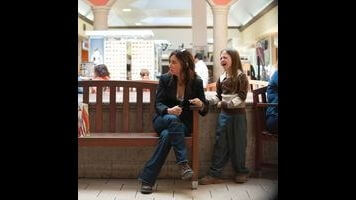In Better Things’ premiere, what’s not said matters most

Better Things’ first episode, named after the main character played by co-creator Pamela Adlon, is filled with half conversations and unspoken thoughts that are still telegraphed so clearly that the show comes out feeling more fully formed than others have been on for considerably longer than one episode. The show bounces from scene to scene, following Adlon’s Sam as she goes through a day, without ever digging deep into one narrative. Instead, “Pilot/Sam” flits from story to story, held together by themes of motherhood and Sam’s presence. And yet, here’s a show in its first episode that feels rich and textured because of what it doesn’t say outright, rather than in spite of it.
Take the conversation Sam has over the phone in the mall bathroom early in the episode. She picks up the phone and without a salutation immediately makes her feelings of disgust known. Ick. It’s Sophie’s Dad. We don’t know it’s Sophie’s Dad yet but we know what to think of this guy, not just that he’s an unwanted a caller but a point of shame. Her daughter, Duke (Olivia Edward), stands by so instead of listing the reasons why Sam no longer wants to be around this hopeful guy, she brushes him off. “I’ll see you at school events,” Sam says, in a tone that belies her true meaning. She doesn’t even want to see him there. There’s no explanation of what’s going on, no joke or punchline set up. But everything that happens in that scene is so deeply felt and understood because Adlon is giving us enough credit to wait for the payoff.
The scene with Sophie’s Dad isn’t the only time where so much is said without much literally being said at all. Sam’s eldest daughter Max (Mikey Madison) greets Sam with a “What?” that Sam volleys back in the same. Their simple meet in the hallway immediately turns into a snit, solely based off the way tones of each escalating “What?” That dialogue exchange says as much about Sam’s relationship with Max does their earlier interactions. Max is a teenager, Sam has a low bullshit tolerance, but is a good mom, and that those qualities lead to tension.
This lack of cohesive dialogue work because Better Things’ tone and point of view is so assured even in its first episode, much like FX’s other freshman half hour Atlanta (calling these shows straight comedies feels weird. Both can be classified as such but feel constrained by the genre label). From the opening scene in which Sam chastises a woman for judging her parenting to choices, Better Things announces what it is about and how it will get there.
Adlon and her partner in crime, Louis CK, are smart to differentiate what they’re doing with Better Things with what CK does with the more abstract Louie, a show that Adlon has been a consistent presence on since the first season. She is not the female Louie and does not intend to be. Better Things, in its first episode, feels less introspective on purpose. When Sam sees Constance Zimmer, the UnREAL actress who is the same type as Sam at an audition, she tells Constance that she’s not dating anyone. “I’m dating my daughters. They’re my love life,” she says. Sam doesn’t have time for the same constant self-reflection. She’s got kids to raise.
But, like Louie, Better Things’ first episode delivered gut punches in the same unexpected ways. The exchange with Constance Zimmer ends when the two tough brunettes watch the lithe, very blond Julie Bowen walk out of the audition room. There are few roles that would call for both a Constance-Sam type and Julie Bowen, but that’s not really the point. Both Constance and Sam walk out dejected knowing they’ve lost before they even get a chance to try. In the final scene, when she tries to talk the director out of a particularly raunchy scene, Sam’s ability to adapt and play along are the same qualities that affect her parenting. She can’t be the role model she wants to be because that means she can’t be the actress that gets the gigs.
It’s fitting, considering how tone shapes the way Better Things is told, that the emotional highpoint of the episode features no words at all. Text messages and flashbacks tell only part of the story of a romance only half experienced. Sam’s undershirted mystery man is thinking about Sam, but he’s not alone, and he does not know how to tell her. Still, Sam’s fantasy is dashed by those three little typing indicator bubbles. They appear and reappear, but they never give Sam answer. Those little text bubbles tell as much of a story as any lines of dialogue could.
Stray observations
- “Is he tall?” “To me.”
- I’m not entirely sold on the Max character yet. Perhaps it’s the way Madison plays Max, all high emotions and dra-ma, but the exchange she and Sam have in the car was a perfect play on both the Cool Mom and the withholding teenager. “Like, don’t you want me to have clean organic pot. You should want me to have good nugs,” Max says to Sam, who is decidedly not the Cool Mom. Sam responds: “These things are normal, but you should be ashamed of them … Hide things from me! Please.”